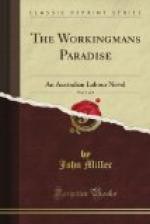“Love comes to few, I think. Society is all askew and, then, we have degraded women. So they are often well-nigh unfit for loving as men are often as unfit themselves. Physically unfit for motherhood, mentally unfit to cherish the monogamic idea that once was sacred with our people, sexually unfit to rouse true sex-passion—such women are being bred by the million in crowded cities and by degenerate country life. They match well with the slaves who ‘move on’ at the bidding of a policeman, or with the knaves who only see in Woman the toy of a feeble lust.
“There are two great reforms needed, Ned, two great reforms which must come if Humanity is to progress, and which must come, sooner or later, either to our race or to some other, because Humanity must progress. One reform is the Reorganisation of Industry. The other is the Recognition of Woman’s Equality. These two are the practical steps by which we move up to the socialistic idea.
“If it ever comes to you to love and be loved by a true woman, Ned, let nothing stand between you and her. If you are weak and lose her you will have lost more than Life itself. If you are strong and win her you can never lose her again though the universe divided you and though Death itself came between you, and you will have lived indeed and found joy in living.”
“Should one give up the Cause for a woman?” asked Ned.
Geisner turned round at last and looked him full in the face.
“Lust only,” he answered, “and there is no shame to which Woman cannot drag Man. Love and there is nothing possible but what is manly and true.”
As he spoke, along the terraced path below them came Nellie, advancing towards them with her free swinging walk and tall lissom figure, noticeable even at a distance among the Sunday promenaders.
“See?” said Geisner, smiling, laying his hand on Ned’s arm. “This is Paradise and there comes Eve.”
PART II. HE KNEW HIMSELF NAKED.
In yesterday’s reach and to-morrow’s,
Out of sight though they lie of to-day,
There have been and there yet shall be sorrows
That smite not and bite not in play.
The life and the love thou despisest,
These hurt us indeed and in vain,
O wise among women, and, wisest,
Our Lady of Pain.—Swinburne.
CHAPTER I.
THE SLAUGHTER OF AN INNOCENT.
Mrs. Hobb’s baby was dying.
“It had clung to its little life so long, in the close Sydney streets, in the stuffy, stifling rooms which were its home; it had battled so bravely; it was being vanquished at last.




